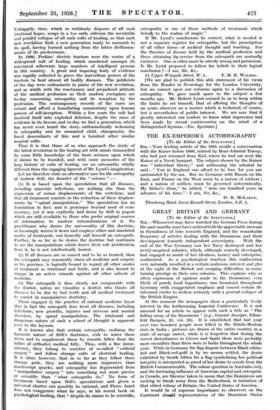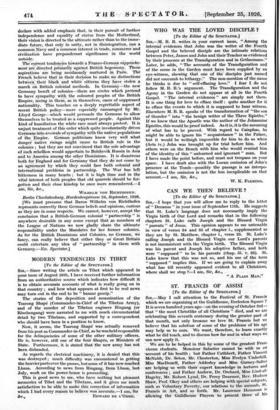GREAT BRITAIN AND GERMANY
[To the Editor of the SPECTATOR.] Sia.,—VVhosoever may have watched the German Press during the past months must have noticed both the appreciable increase in friendliness of tone towards England, and the remarkable frequency of articles dealing with the Dominions and their development towards independent sovereignty. With the end of the War Germany saw her Navy destroyed and her newly-acquired colonies, which, although scarcely developed, had engaged so much of her idealism, money and enterprise, confiscated. As a psychological reaction this confiscation very naturally resulted in a certain malicious interest and glee at the sight of the British not escaping difficulties in main- taining prestige in their own colonies. This explains why so often expression of opinion made in the Dominions, very likely of purely local importance, was broadcast throughout Germany with exaggerated emphasis and caused certain ill- informed circles to reckon seriously with a general collapse of the British Empire.
At the moment the newspapers show a particularly lively interest in the forthcoming Imperial Conference. It is not unusual for an article to appear with such a title as "The falling away of the Dominions" (e.g., General Anzeiger, E/ber- feld Barmen, 21, viii. 26). It is established that last year over two hundred people were killed in the Hindu-Moslem riots in India ; pictures are drawn of the entire country in a state of savage unrest, while it is forgotten that during the recent disturbances in Greece and Spain there were probably more casualties than there were in India throughout the whole year. While in Germany the flag dispute between Black-white- red and Black-red-gold is by no means settled, the desire exhibited by South Africa for a flag symbolizing her political integrity is interpreted as proof of her desire to secede from the British Commonwealth. The colour question in Australia (gic), and the increasing influence of American capital and enterprise in Canada, are likewise taken to mean that the Dominions are seeking to break away from the Motherland, in imitation of that oldest colony of Britain, the United States of America.
. It would be of supreme importance to observers on the Continent shod representatives of the Dominion States declare with added emphasis, that, in their pursuit of further independence and equality of status 'from the Motherland; thar visionis directed te the ultimate rather than to the imme- diate future, that only in unity, not in disintegration, Can a common Navy and a 'common interest in trade, commerce and civilization have preponderant significance in .the world outside.
The current tendencies tOwarda. a .Franco-German raPpinche- rnent are directed primarily against British hegemony, These - . aspirations are being assiduously nurtured in Paris. The French believe that in their decision to make no distinctions between their black and white citizens they have stolen a march on British colonial methods. In Germany—the new Germany bereft of colonies—there are circles which pretend to have sympathy: With the coloured peoples of the British Empire, Seeing in them, as in themselves, cases of suppressed nationality. This touches on a deeply regrettable aspect of recent British policy—more especially encouraged' by Mr. Lloyd George—which would persuade the Germans to allow themselves to be treated is a suppressed people. Against this kind of humiliation the white race must always protest. It is unjust treatment of this order which quite involuntarily drives GerMans into avowals of sympathy with the native populations of the Empire. German politicians know very well what danger native risings :might "cause to British rule in the colonies ; but they are not convinced that the sole advantage ofiuch rebellion would appertain to Bolshevik_Russia in Asia . •• • • and to America among the other -DOMinions. It is disastrous both for England and for Germany' that they do -not cOme to . . . , an agreement by which they could face both colonial and international problems in partnership. The ..War` has left bitterness in many hearts, but it is high time and in the vital interest of both peoples that Old quarrels shiatild be for:. gotten and their close kinship be once More remembered.—! am, Sir, &c., WILHP.L141 VON EICHTROFEN.
Berlin Charlotteriburg, Hardenbergstrasse 24, Septetnber, 1926. [We mOst presume that' Baron" Wilhelm von Richthofen represents correctly these German beliefs and opinions, curious as they are in Some 'respects. We cannot, however, accept the conclusion that a British-German Colonial " partnership " is anywhere desirable in any sense except that as members of the League of Nations we now gladly share the ultimate responsibility under the Mandates for her former colonies. As for the British Dominions and Colonies, no German, We fancy, can really believe that either they or Great Britain could entertain any idea of " partnership " in them with Germany.—En. Spectator.]















































 Previous page
Previous page